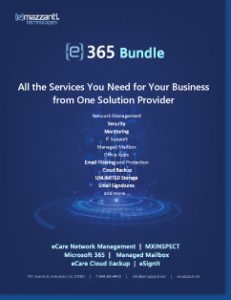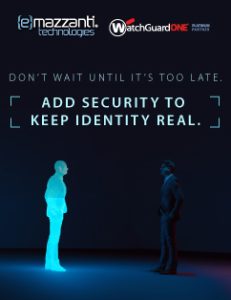Reprinted with permission from the Microsoft Small Business Center
 When it comes to e-mail, I’m a packrat. No, it is not true that I still have the first e-mail I ever received. But I probably have my first e-mail from the year 2000. In fact, I probably have all my e-mails from the year 2000. So of course, I have everything since then, too.
When it comes to e-mail, I’m a packrat. No, it is not true that I still have the first e-mail I ever received. But I probably have my first e-mail from the year 2000. In fact, I probably have all my e-mails from the year 2000. So of course, I have everything since then, too.
Why do I have all this stuff? I’m not sure, frankly. Maybe I was concerned that I would be sued over some imaginary transgression and would need an e-trail to prove my innocence. Or maybe I was vaguely concerned about some legal requirement to save this stuff.
I’m not the only one doing this. Some of you have thousands of e-mails, too. And you probably don’t know why you’re saving them, either. Maybe you’re worried about going to jail over some stupid e-mail you can’t find.
I’m hardly an expert in what e-mail documents and records to save. So I talked to Donald Skupsky, the president of Information Requirements Clearinghouse. He modestly describes himself as the world’s leading expert in this area. I also talked with Charles Fine, a Phoenix attorney.
Here are some things to consider when you wonder whether or not to save e-mail, particularly in light of the federal Sarbanes-Oxley Act of 2002, which imposes more requirements on mostly public companies to preserve records. Obviously, if you still have questions, talk to a lawyer.
1. Save important records. But e-mail is not always considered a record. Companies should save records of business transactions. If you sign a contract, save that contract. If you receive the contract as an attachment to an e-mail, and the other party says in the e-mail, “We accept the contract,” save the e-mail too. That constitutes a record. So if you would keep it as a paper document, keep the e-mail. Otherwise, pitch it. That includes e-mails generated during the contract process. This is work-in-progress material, and does not reflect the thinking of an organization. Rather, they are the thoughts of individuals. When you do keep something, store it formally. Don’t leave it in your e-mail program where no one can find it. You might be best off to print it and put it in a folder.
2. Sometimes, keep more. There are certain times in which you cannot discard things. For instance, if you are part of a legal process, you can’t delete anything that is relevant. I’d err on the side of caution. Better yet, follow your lawyer’s advice. Even if you are not currently in a legal process, there are two other important words: imminent and foreseeable. If you’re on notice that you’ll be indicted, things are imminent. Now is not a good time to clean out your e-mails. If you make a big boo-boo and somebody gets hurt, a lawsuit is foreseeable. Again, be careful. Talk to your lawyer. According to Skupsky, only the securities industry is required to keep all of its e-mails. But the Sarbanes-Oxley Act has added considerably to the record-keeping burden of some companies — mostly public companies or companies who do business with public companies. (For more on Sarbanes-Oxley’s effect on private companies, see this article.)Again, if you think you may be affected by Sarbanes-Oxley, see your lawyer.
3. But don’t keep everything. Most likely, those e-mails piling up probably won’t hurt anything (except your server space). Most of us get into business because we see an unanswered need. We want to help our customers. We’ve never been sued, and never expect to be. However, it could very well happen. Let’s say that, after exercising superhuman patience, you fire Joe Screwup. You could not have treated Screwup better, but, of course, he doesn’t see it that way. So Screwup sues. You’re not worried. But then you get a subpoena, ordering you to submit any e-mail from the past three years that bears on the case. There’s nothing in the e-mail that would affect the case, and Screwup knows it. But you’ll have to dig up everything you have, and your lawyer will go through it, looking for relevant material. How many hours, at $200 per hour, will it take her to do that? So you swallow hard and give Screwup $15,000 to go away. You may never have thought about this, but you can bet that the plaintiffs’ bar has. Worse, maybe they find an e-mail in which you express intemperate remarks. The e-mailwas probably meaningless, but Screwup’s attorney will make you look like Adolf Hitler. Given the potential problems, why save e-mail? Sure, this scenario is pretty unlikely. But 99.9% of your old e-mail is junk, anyway. Why take the risk?
4. Develop a policy on e-mail retention. Skupsky recommends a personal 30-day deadline for taking action. After 30 days, your employees (and you) have to decide if an e-mail is a record. If not, it goes. This has the salutary effect of forcing your employees to think about what a record is, and is not. Attorney Chuck Fine thinks that’s a good idea. But he goes further, and chucks (no pun intended) his e-mail immediately. Don’t back up your e-mail. This is no different than keeping it on your computer. If you’re subpoenaed, you and your lawyer will have to go through it, whether it’s on the computer or on tape. Delete the old stuff. According to Skupsky, old e-mail is rarely useful to the other side. But if it costs $50,000 to go through it, the plaintiff doesn’t care. Neither does his lawyer. They have nothing to lose. Discovery is a wonderful weapon to force a settlement. So I’m cleaning out my old e-mails. No, really! It’s difficult, though. I’ve had them so long, they’re like old pals. You should clean out yours, too. We have to be strong about this.

Carl Mazzanti is Co-Founder and President of eMazzanti Technologies, Microsoft’s four time Partner of the Year and one of the premier IT consulting services for businesses throughout the New York metropolitan area and internationally. Carl and his company manage over 400 active accounts ranging from professional services firms to high-end global retailers.
eMazzanti is all about delivering powerful, efficient outsourced IT services, such as computer network management and troubleshooting, managed print, PCI DSS compliance, green computing, mobile workforce technology, information security, cloud computing, and business continuity and disaster recovery.
Carl Mazzanti is also a frequent business conference speaker and technology talk show guest and contributor at Microsoft-focused events, including frequent prominent roles at the Microsoft Inspire (Worldwide Partner Conference / WPC).
Carl, a serial Entrepreneur, gives back to the community through Entrepreneur teaching engagements at Georgetown University, the company’s ocean wildlife conservation effort, the Blue Project, and Tree Mazzanti.












